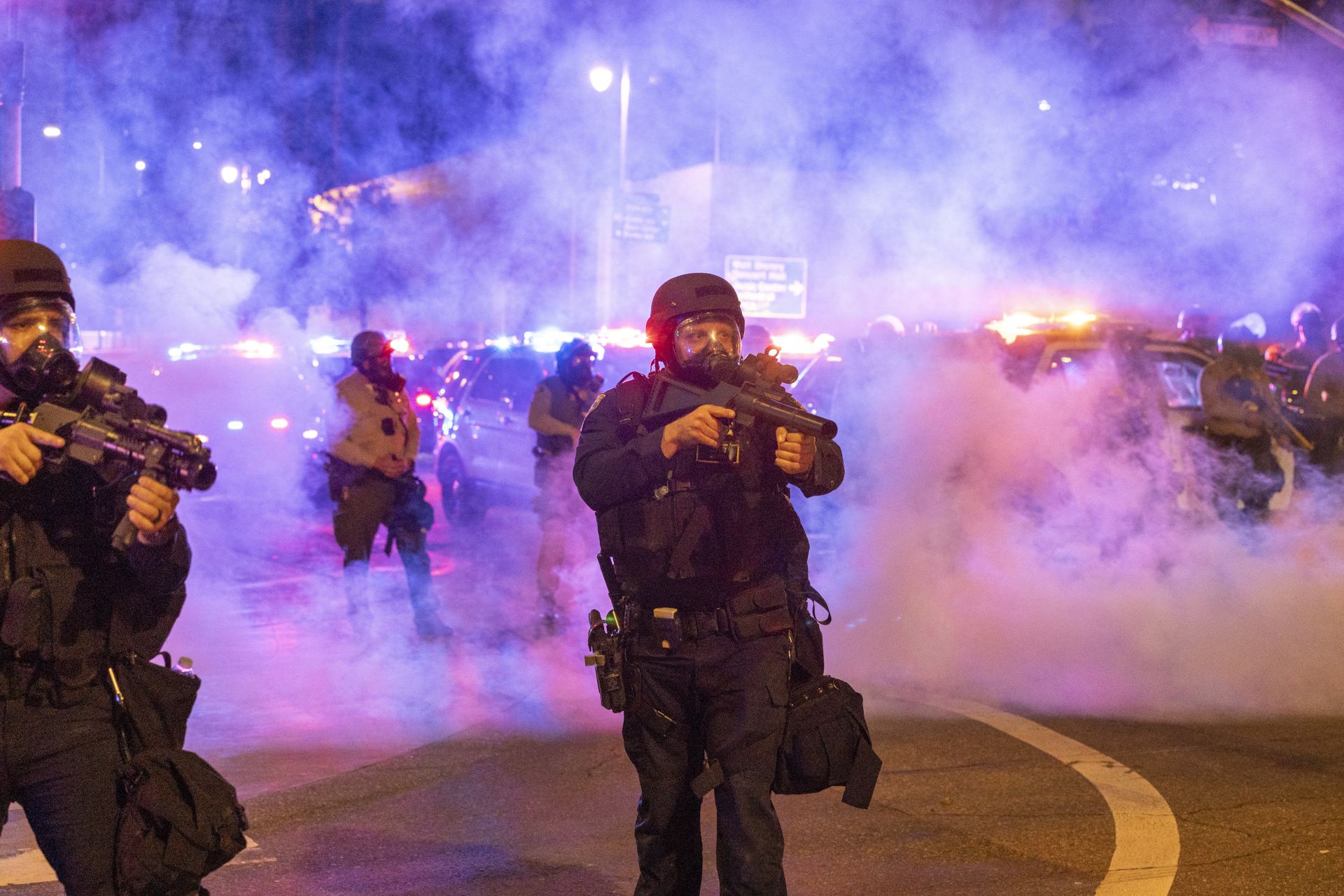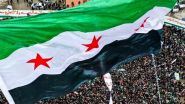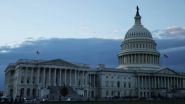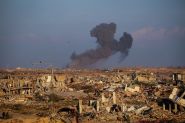- Home
- Middle East
- Trump Blames 'Insurrectionists' for Los Angeles Unrest

Law enforcement take positions on the streets surrounding the federal building during a protest following federal immigration operations in Los Angeles, California, on June 8, 2025. ©Ringo Chiu / AFP
US President Donald Trump on Monday blamed "insurrectionists" for unrest in Los Angeles after he sent in National Guard troops to quell protests against immigration raids.
"The people that are causing the problems are professional agitators and insurrectionists," Trump told reporters at the White House.
"They're bad people; they should be in jail," he added when asked about the clashes occurring in parts of the second-biggest US city.
The Republican, who turns 79 on Saturday, did not give evidence of why the street protesters are insurrectionists.
Trump was returning to the White House after meeting with senior US officials and military officers at his Camp David presidential retreat. Before talking to reporters, he greeted workers at the site of a new flagpole he has ordered to be erected outside the White House.
Trump did not reply when asked several times by reporters whether he plans to invoke the Insurrection Act, which would allow the military to be used as a domestic police force.
The White House has previously said Trump relied on a seldom-used law, known as Title 10, to deploy the National Guard to Los Angeles despite California's Democratic governor, Gavin Newsom, saying the move was unnecessary, given the limited nature of the protests.
Trump lashed out at Newsom, who has been widely tipped as a possible 2028 presidential candidate, over the unrest.
"He's done a terrible job. Look, I like Gavin Newsom; he's a nice guy -- but he's grossly incompetent, everybody knows," Trump said.
Newsom dared Trump's border czar Tom Homan, over the weekend to arrest him after Homan said the governor and LA Mayor Karen Bass could face federal charges of trying to impede immigration agents.
"I would do it if I were Tom," Trump said when asked if Homan should arrest Newsom.
Asserting Power
By deploying the military in California against the wishes of local authorities and threatening to send troops to any American cities experiencing protests against his immigration policy, Donald Trump has taken a new step in asserting his power.
"They spit, we strike": This was how the American president summarized his firm stance on the clashes in Los Angeles over the past three days, which were part of protests against the federal government's radical anti-immigration policy.
By sending 2,000 troops into the streets of the Californian metropolis, the 78-year-old Republican ordered the first deployment of the National Guard since 1965, a reserve force organized at the state level, without prior approval from a governor.
"It's an unnecessary escalation and an abuse of power," said Hina Shamsi from the influential ACLU civil rights organization in a statement.
For years, President or candidate Trump has mentioned using the military for law enforcement, but he had not acted on it during his first term in the White House (2017-2021).
Military Parade
This time, he seems determined to fully exercise his powers as "commander-in-chief," both by sending troops and through more symbolic decisions.
On Saturday, Washington will host a rare military parade, marking 250 years since the creation of the U.S. military, as well as Donald Trump's 79th birthday, fulfilling a long-held project.
The president’s entourage frames the fight against illegal immigration as a battle for "civilization," justifying any means.
"Los Angeles is proof that mass immigration destroys societies. (...) If you don't address the immigration issue, nothing else can be resolved or saved," wrote Stephen Miller, Trump's close adviser and main spokesperson for the "America First" ideology, on X.
Donald Trump was asked on Sunday what would justify going a step further, such as sending active-duty Marines to Los Angeles.
"The justification will be what I think," he responded, staying true to his maximalist view of presidential powers, despite the constitutional checks of the judiciary and Congress.
He did not rule out sending the military to any American cities where protests against deportations of illegal immigrants take place.
"Slippery Slope"
The Republican "tends to use big words and exaggerate often," noted William Banks, a law professor at Syracuse University, in an interview with AFP.
But if he acts and deploys active-duty troops, "he goes against the American tradition of leaving law enforcement to civilians, meaning the police," the expert continued.
To deploy the Marines, he would need to formally invoke the "Insurrection Act," which has only been used about thirty times since the founding of the United States.
"This law is invoked 'when everything goes wrong,'" summarized Banks. "It’s a slippery slope. If he declares an insurrection, his powers will be almost unlimited."
Beyond the legal aspect, the showdown is highly political.
California is a Democratic stronghold, even though Trump made some local inroads in the last presidential election.
For American radical right-wingers, it also serves as a symbol of progressive policies.
The American president sharply criticized Los Angeles Mayor Karen Bass and California Governor Gavin Newsom on his Truth Social platform, accusing them of being "incapable" of restoring calm in the Californian metropolis.
He also threatened legal consequences for California officials who oppose deportation operations.
"If any officials oppose the law and order, yes, they will face federal prosecution," Trump assured.
AFP
Read more



Comments